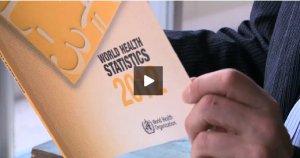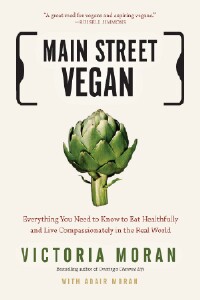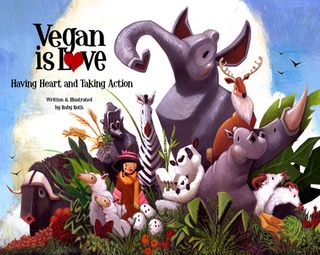|
Because the heart beats under a covering of hair, of fur, feathers, or wings, it is, for that reason, to be of no account? Jean Paul Richter
|
In this edition...
Featured Video |
 Bill Clinton on going vegan Bill Clinton on going vegan |
Health |
 Scientists floored by drugs found in poultry Scientists floored by drugs found in poultry |
 Could 'fatter' chicken be contributing to the obesity epidemic? Could 'fatter' chicken be contributing to the obesity epidemic? |
 There is no 'mad kale' disease There is no 'mad kale' disease |
 Resistant starch from plants offers potential to protect against bowel cancer Resistant starch from plants offers potential to protect against bowel cancer |
 Dr. McDougall is changing lives and lowering health care costs Dr. McDougall is changing lives and lowering health care costs |
Environment and World Hunger |
 Canadian report highlights hidden costs of factory farms Canadian report highlights hidden costs of factory farms |
 Climate scepticism threatens people, planet - IPCC chief Climate scepticism threatens people, planet - IPCC chief |
 Living Planet Report 2012: Over consumption is threatening the earth, killing off wildlife Living Planet Report 2012: Over consumption is threatening the earth, killing off wildlife |
 Video: How agriculture is changing the face of our planet Video: How agriculture is changing the face of our planet |
Lifestyles and Trends |
 Veggie experiences: 'Mostly I'm a vegan' Veggie experiences: 'Mostly I'm a vegan' |
 Is this the end of meat? Is this the end of meat? |
 Survey reveals 5 interesting facts about plant-based food choices Survey reveals 5 interesting facts about plant-based food choices |
 Cruise line makes it easy to be veggie on the high seas Cruise line makes it easy to be veggie on the high seas |
Animal Issues and Advocacy |
 Processed food: 9 nasty truths about the meals you eat Processed food: 9 nasty truths about the meals you eat |
 500,000 chickens killed in fire 500,000 chickens killed in fire |
 Organic doesn't mean humane for chickens Organic doesn't mean humane for chickens |
 Animal sentience: Ravens remember and greet you accordingly Animal sentience: Ravens remember and greet you accordingly |
 Anti-shark fin rally in New York City Anti-shark fin rally in New York City |
Books, Films and Perspectives |
 Interview: Veganism is a 'moral imperative', not just a lifestyle choice Interview: Veganism is a 'moral imperative', not just a lifestyle choice |
 How to go vegan in the real world How to go vegan in the real world |
 New children's book explains that 'Vegan is Love' New children's book explains that 'Vegan is Love' |
 In 'Whale Wars: Viking Shores' Paul Watson takes on Faroes killing In 'Whale Wars: Viking Shores' Paul Watson takes on Faroes killing |
|

|
|
|
Don't forget to visit:

|
|
(Excerpts are included from current news stories. Click on the "Full story" link to read the full article.)
Featured Video 
|
Bill Clinton on going vegan
Watch video: Ellen Show
 Ellen and President Clinton have a special habit in common - they're both vegan! President Clinton told Ellen about his decision to switch to a whole foods, plant-based diet - and the positive effect on his health. [1:12]
Watch video... Ellen and President Clinton have a special habit in common - they're both vegan! President Clinton told Ellen about his decision to switch to a whole foods, plant-based diet - and the positive effect on his health. [1:12]
Watch video... |
|
|
Health 
|
Scientists floored by drugs found in poultry
Full story: Guardian, UK
So, here is the deal. We create hellish conditions for our livestock, then we drug them to keep them numb. Then we drug them again to wake them from their pharmaceutical stupor. Then we drug them to grow faster. Then we drug them so their flesh will look healthier. Then we drug them to withstand the disease epidemics that our overcrowding has created. Then, of course, we drug ourselves every time we take a bite of factory-farmed poultry. "We were kind of floored," Keeve E Nachman, a co-author of [a study on the subject]. "It's unbelievable what we found." While Nachman says that the levels of arsenic and the witches' brew of other drugs and chemicals in the chicken samples may not be high enough to harm humans, he is not betting his own health on it.
|
Could 'fatter' chicken be contributing to the obesity epidemic?
Full story: Huffington Post
You're watching your weight, so you opt for chicken rather than red meat as your go-to smart diet choice, right? We all thought of chicken as lean, protein-rich food that's good for weight watching, but the truth is chicken might actually be making us fatter! Here's the skinny: Virtually all commercially-available chickens now have what many call the "obese gene," which makes birds gain weight quickly to speed up production from birth to slaughter. That, combined with no exercise and a constant supply of high-energy (caloric) food, makes today's chicken the opposite of lean: The amount of fat in modern chicken may be five or even 10 times what it used to be, according to a UK-based study. That's a whole lotta fat, and big trouble for the waistline. The nonprofit Farm Forward explains that this is another consequence of inhumane factory farming. So basically, what's bad for the chickens is bad for us; it's all related. [See also Dr. Greger's NutritionFacts video]
|
There is no 'mad kale' disease
Full story: Dr. Barnard's Blog
Is beef safe? That's the question Americans are asking again after a new case of mad cow disease was confirmed in the United States this week. The answer is clearly no, beef is not safe. But the threat of mad cow disease isn't the only reason. Not by a long shot. Meaty diets harbor enough saturated fat and cholesterol to bring on a heart attack. They are also linked to cancer, diabetes, and obesity. A switch to chicken or fish does very little to reduce risk. But plant-based diets - loaded with vegetables, fruit, grains, and legumes - can help prevent and reverse all of these diseases. That's right. There is no "mad kale" disease.
|
Dr. Barnard's Blog - April 25
|
Resistant starch from plants offers potential to protect against bowel cancer
Full story: CSIRO, National Science Agency of Australia
Western diets are typically low in fibre and have been linked with a higher incidence of bowel cancer. Even though Australians eat more dietary fibre than many other western countries, bowel cancer is still the second most commonly reported cancer in Australia. Dr David Topping, from CSIRO's Food Futures Flagship, said this is referred to as 'the Australian paradox.' "We think the answer is that we don't eat enough resistant starch," Dr Topping said. Resistant starch is sometimes called the third type of dietary fibre (in addition to soluble and insoluble fibre) and is found in legumes, some wholegrain breads and cereals, bananas, potatoes, pasta and rice. The recommended intake of resistant starch is around 20 grams a day, which is almost four times greater than a typical western diet provides. Twenty grams is equivalent to eating three cups of cooked lentils.
|
CSIRO, National Science Agency of Australia - April 26
|
Dr. McDougall is changing lives and lowering health care costs
Watch video: Vimeo/Dr. McDougall
 John McDougall MD, author of The Starch Solution helps U.S. companies dramatically lower their health care costs and transforms employees' lives with simple dietary changes. Watch video... John McDougall MD, author of The Starch Solution helps U.S. companies dramatically lower their health care costs and transforms employees' lives with simple dietary changes. Watch video... |
Vimeo/Dr. McDougall - April
|
More Health News:

A new report by the World Health Organization with input from 194 countries puts the spotlight on the growing burden of non-communicable diseases triggered by risk factors such as diabetes and high blood pressure, no longer just in high-income countries, with the spread of unhealthy diets. [2:40] - UN News Centre (May 16)
Berries may preserve memory
Women with the highest intake of blueberries or strawberries showed about 1.5 to 2.5 years of delays in cognitive aging such as thinking, remembering and reasoning abilities. - CBC, Canada (April 26)
Dairy and fast food are taking India’s diet in the wrong direction
Dr. Barnard's blog, PCRM (May 3)
Coming to a burger near you: Pink slime and mad cow disease
By John Robbins - Huffington Post (April 26)
|
|
Environment and World Hunger 
|
Canadian report highlights hidden costs of factory farms
Full story: National Post
Poultry waste fed to cattle, pigs pumped with growth-promoting antibiotics, and mounds of manure dumped in ditches. These and other scenarios are used to take aim at the "largely hidden" costs of intensive livestock operations to public health, the environment and rural community development in a report by the Canadian office of the World Society for the Protection of Animals. The 163-page report - titled What's on Your Plate: The Hidden Costs of Industrial Animal Agriculture in Canada - is the culmination of an 20-month project that began when the organization convened recognized experts in their fields and commissioned a multidisciplinary review of the impacts of Canada's industrial animal agriculture practices.
|
Climate scepticism threatens people, planet - IPCC chief
Full story: AlertNet
Continuing scepticism about climate change in some parts of the world threatens the planet and the people on it, according to Rajendra K. Pachauri, chief of the Nobel-prize winning Intergovernmental Panel on Climate Change. "I think global society has to realise that we are affecting the climate of this planet and this is the only planet that we have," he said in Bangkok May 4 at the Southeast Asia launch of the IPCC special report on managing the risks of extreme events and disasters.
|
Living Planet Report 2012: Over consumption is threatening the earth, killing off wildlife
Full story: Telegraph, UK
Humans are using 50 per cent more resources than the Earth can provide, and unless fundamental changes are made in the way we produce energy, food, and if we cannot curb our consumption of other natural resources that number will continue to skyrocket, according to a new report. Released [May 15] by the World Wildlife Fund, The Living Planet Report, warns that if humans cannot shift their behavior by 2030, even two planets will not be enough to support modern society.
|
Video: How agriculture is changing the face of our planet
Watch video: Jonathan Foley
 A short film excerpt that summarizes the key points from a TED Talk by Jonathan Foley director of the Institute on the Environment at the University of the Minnesota. Foley's work focuses on the sustainability of our civilization and the global environment. This short film and his full talk in more detail show graphically with satellite images how agriculture and land use are a huge factor in the global environment, and could grow even larger as we look to feed over 9 billion people in the future.
Watch video... A short film excerpt that summarizes the key points from a TED Talk by Jonathan Foley director of the Institute on the Environment at the University of the Minnesota. Foley's work focuses on the sustainability of our civilization and the global environment. This short film and his full talk in more detail show graphically with satellite images how agriculture and land use are a huge factor in the global environment, and could grow even larger as we look to feed over 9 billion people in the future.
Watch video... |
|
Lifestyles and Trends 
|
Veggie experiences: 'Mostly I'm a vegan'
Full story: Other Words
Studies have found that a little meat is better for you than a lot, no meat is better than a little, and a vegan diet - no meat, fish, eggs, or dairy products (in others words, 90 per cent of the farm economy) - is best of all. I'll order fish in a restaurant and eat what I'm served in someone else's home. And when I go to a ballgame, I declare hotdogs a vegetable for the day. Mostly, though, I'm a vegan. Why not? Catholics, for example, profess a high moral standard but still sin from time to time. That doesn't mean they're not Catholics; it simply means they're human. As a matter of fact, I'm thinking of starting a Church of the Holy Vegetable and offering online confession booths to vegans who fall off the wagon from time to time. They could confess, be assigned a small penance, and receive absolution. The life of a vegan is hard enough without walking around feeling guilty all of the time.
|
Is this the end of meat?
Full story: Independent, UK
Nothing in The Vegetarian Butcher [in the Hague, Netherlands], despite being labelled and heavily marketed to the contrary, contains animal flesh. And the business is booming: it has expanded from just one shop, when it opened late in 2010, to selling in 180 Netherlands outlets, with 500 supermarkets joining this summer and international distribution underway. But who is buying this stuff in such great numbers - and why? As a vegetarian who greets a new substitute meat with disproportionate enthusiasm, I have some inkling. But why the meaty marketing - and what might it all mean for the future of vegetarian food generally: is meat in the 21st century destined to go the same was as fur, where faux becomes the mainstream version?
|
Survey reveals 5 interesting facts about plant-based food choices
Full story: Huffington Post
While vegans still account for only 2.5 per cent of the population in the U.S. (an impressive doubling in size since 2009), what's really interesting is that 100 million people (approximately 33 per cent of the U.S. population) are eating vegan/vegetarian meals more often, though they are not vegan or vegetarian. A new survey by the Vegetarian Resource Group revealed the following interesting (and some surprising) details about food choices that vegans, vegetarians and the veg-curious are making...
|
Huffington Post - April 24
|
Cruise line makes it easy to be veggie on the high seas
Full story: USA Today
Holland America's latest plan to draw more customers: Serve more vegetables. The Seattle-based cruise operator [recently] announced that it is revamping its food offerings to offer more options for vegetarians and vegans than any other line. The changes include the addition of a new, all-vegetarian menu that will be available in the dining rooms on Holland America's 15 ships and the addition of 30 new vegetarian dishes to standard dining room menus. Check out some of 22 choices at the link - including: Portobello Mushroom and Chipotle Quesadillas; Vietnamese Vegetable Spring Rolls; Curried Vegetable Empanadas; Spicy Lentil and Garbanzo Salad; Sweet and Sour Vegetable Tempura...
|
|
Animal Issues and Advocacy 
|
Processed food: 9 nasty truths about the meals you eat
Full story: Huffington Post
Thanks to factory farming's massive economies of scale, a lot of food today is disgusting or cruel or disgusting and cruel. Here are some shocking facts that Big Food would like to mute with Ag-Gag and food defamation laws [slide show]...
|
500,000 chickens killed in fire
Full story: Care2
As if we needed another reason to loathe the factory farming industry, reports coming out of Colorado confirm that roughly half a million chickens died in a fire at an egg farm. Although the cause of the fire is still unknown, the reason these poor animals perished is plain: humans locked them in an unhealthy, unnatural environment, 125,000 at a time. Had these chickens been free to graze and peck in a pasture as nature intended, this type of waste and destruction wouldn't be possible.
|
Organic doesn't mean humane for chickens
Full story: Care2
Do you want to eat poultry and eggs, but only if the birds lived and died humanely? Bad news: choosing "organic" poultry does not get you where you want to go. United Poultry Concerns (UPC) reported the findings of an eyewitness on a certified organic farm in a February 11, 2004 paper titled "Free Range Poultry and Eggs": the birds never set foot outside, and they were jam-packed into their barn.
|
Animal sentience: Ravens remember and greet you accordingly
Watch video: Discovery News
When you go outside, do the birds sound happy or angry when they see you? New research has found that at least one group of birds, ravens, remembers prior interactions with people and varies calls based on those earlier experiences. So it's not too far-fetched to think that if you bothered a bird some time ago, the bird might unleash the avian version of swearing the next time you approach.
Watch video... |
Discovery News - April 19
|
Anti-shark fin rally in New York City
Full story: Reuters
 A short video of the recent rally in New York City in support of a new law banning shark finning. Asian-American City Council Member Margaret Chin says, "Shark fin soup may be a time honored tradition for a small group of people but it has no place in today's society. I stand here today to say that I will not support an industry that thrives off cruelty. And I call on the Asian-American community to stand with me." A short video of the recent rally in New York City in support of a new law banning shark finning. Asian-American City Council Member Margaret Chin says, "Shark fin soup may be a time honored tradition for a small group of people but it has no place in today's society. I stand here today to say that I will not support an industry that thrives off cruelty. And I call on the Asian-American community to stand with me."
|
|
Books, Films and Perspectives 
|
Interview: Veganism is a 'moral imperative', not just a lifestyle choice
Full story: Bucknell University
[Interview with Gary Steiner, John Howard Harris Professor of Philosophy.] I argue that there is no logical connection between the kind of cognitive abilities a being has and its moral status. There are relatively few people who would say that infants don't deserve moral status and yet they, up to a certain point in life, lack the ability to speak. The fact that animals cannot use human speech doesn't change the fact that there are many, many non-human animals on earth who have rich subjective lives that mean a lot to them. In my newest book, Animals and the Limits of Postmodernism, I argue for the notion of veganism as a candidate for a moral imperative not merely as a lifestyle choice. You don't find people saying that slave ownership is a lifestyle choice. I argue that it's a completely apt analogy. Animals have just as much right not to be killed and eaten for food, or to be enslaved, as you or I have. That's what I mean when I say that humans and animals are morally equivalent. I call it the vegan imperative.
|
Bucknell University - April 19
|
How to go vegan in the real world
Full story: Miami Times
 When I first read about Victoria Moran's Main Street Vegan, I thought the book was beneath me. After all, it's primarily a guidebook for aspiring vegans, and I've been on the vegan wagon for a few years now. In reading it, though, I learned some powerful new things about the ethics of veganism (and here I thought I already knew everything I didn't want to know about slaughterhouses!), some addictive food factors that destroy aspiring vegans' best efforts, tips on how to save money at the grocery store, good vegan etiquette, and a bunch of cool recipes. Beyond all that, I appreciated Moran's personal and relatable storytelling. When I first read about Victoria Moran's Main Street Vegan, I thought the book was beneath me. After all, it's primarily a guidebook for aspiring vegans, and I've been on the vegan wagon for a few years now. In reading it, though, I learned some powerful new things about the ethics of veganism (and here I thought I already knew everything I didn't want to know about slaughterhouses!), some addictive food factors that destroy aspiring vegans' best efforts, tips on how to save money at the grocery store, good vegan etiquette, and a bunch of cool recipes. Beyond all that, I appreciated Moran's personal and relatable storytelling.
|
New children's book explains that 'Vegan is Love'
Full story: Huffington Post
 Author/illustrator Ruby Roth's newly released children's book, Vegan is Love, has drawn plenty of praise from notable figures such as Jane Goodall, Gene Baur and singer Jason Mraz. Building on the success of her first book, That's Why We Don't Eat Animals, Roth offers a more detailed description of vegan living in Vegan is Love, complete with information for children to make cruelty-free choices at home, in school and in their communities. Some critics of Roth's book say it is inappropriate for children because of its subject matter and the book's references to animal testing, factory farm pollution and animal cruelty. Roth answers questions about the book and how she developed its intriguing illustrations. Author/illustrator Ruby Roth's newly released children's book, Vegan is Love, has drawn plenty of praise from notable figures such as Jane Goodall, Gene Baur and singer Jason Mraz. Building on the success of her first book, That's Why We Don't Eat Animals, Roth offers a more detailed description of vegan living in Vegan is Love, complete with information for children to make cruelty-free choices at home, in school and in their communities. Some critics of Roth's book say it is inappropriate for children because of its subject matter and the book's references to animal testing, factory farm pollution and animal cruelty. Roth answers questions about the book and how she developed its intriguing illustrations.
|
In 'Whale Wars: Viking Shores' Paul Watson takes on Faroes killing
Full story: Los Angeles Times
The Sea Shepherd Conservation Society, capitalizing on the tremendous success of their Animal Planet TV show, Whale Wars, has now taken on a new battle. With the Japanese fleet's Antarctic hunt finished for the season, the skull-and-crossbones crew have turned their attention on the Faroe Islands with a new show: Whale Wars: Viking Shores. In the Faroe Islands, the oceangoing conservation outfit is not hectoring a faceless, corporate, government-subsidized commercial whaling outfit with massive factory ships that kill whales in the name of "research." On this grouping of 18 small islands in the North Atlantic, the people kill pilot whales by hand, on the shore, as part of a traditional hunt called the "Grind," (pronounced "grinned") which residents say is thousands of years old. The Grind is not pretty, and Viking Shores pulls no punches... We actually have a segment of the Faroese population that's now opposed to it.
|
Los Angeles Times - April 26
|
|
|
Note:
|
Whenever possible, stories are linked to the original source. Some sites may require registration, and/or not archive the stories. All links were active at the time of publication.
|
|
|
|
| The VegE-News is prepared by: |

|
|
|
|
To ensure that you continue to receive the VegE-News, please add the sender to your address book or safe list. This will help ensure that it doesn't get zapped by your spam filter and wind up in your JUNK or TRASH folder.
|
|